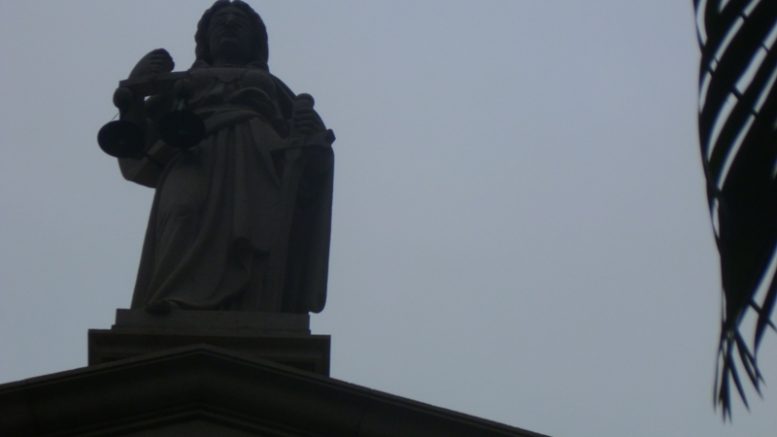By Chris Yeung —
Hong Kong’s 2021 legal year kicked off on Monday with a new Chief Justice, the city’s third since the 1997 handover, taking office and a fierce battle over the independent powers of the judiciary looming.
In his first speech delivered as the head of the judiciary to mark the opening of the legal year, Andrew Cheung said judges must not be subject to improper pressure or influence when discharging their duties.
He maintained there is a proper channel for people to express their dissatisfaction with court decisions. Cheung rejected calls trumpeted by pro-Beijing politicians and state-run media for the setting up of a panel to review sentencing, insisting this role is best served by the courts themselves.
In his argument against the idea of a new panel, Cheung said the Court of Appeal had dealt with eight sentence reviews from “social events” cases. No less than seven more cases would be heard in the coming few months, he said, adding similar appeals and reviews would be fast-tracked.
Taking the hot seat vacated by Geoffrey Ma, Cheung has sought to defend the independence and ability of the judiciary making self-correction over courts’ decisions if and when necessary.
It is clearly aimed to counter the calls for a review panel made by the pro-Beijing flagship, Democratic Alliance for the Betterment of Hong Kong, among others. DAB vice-chairman, Holden Chow, said such a panel was needed, claiming that sentences handed down to some anti-government protesters had been too lenient.
Though lacking details, the setting up of a sentencing review panel is no doubt the most controversial demand in the campaign for judicial reform launched by the pro-Beijing force.
If implemented, the new body, presumably to be appointed by the Chief Executive, will effectively be given powers to adjudicate sentences handed down by judges.
The integrity and autonomy of the judicial system will be seriously undermined with the addition of a review panel.
Faced with the orchestrated calls for a revamp of the judiciary, Cheung made attempts to silence the critics by promising efforts to meet the demands for greater accountability and transparency in handling complaints against judges.
That will be hardly enough to shut the mouths of the judiciary-bashers, whose endgame is to turn the judiciary into a subordinate of the executive authorities. To them, judicial independence will only be allowed to exist in name, not in substance.
It is difficult to ascertain the stance of the central government over the idea of a review panel at this stage. It is also unclear whether the idea is only a tactical move aimed to put pressure on courts in their sentencing of cases relating to the anti-extradition bill protests or it is the ultimate goal of the campaign for a judicial revamp.
It looks certain the judiciary will be bracing for stormy waters this year with a string of upcoming highly-controversial cases being put to court for formal charges or hearing.
They include the government appeal of a bail decision on Apple Daily boss Jimmy Lai, scheduled for February and a spate of national security-related cases that involved Lai and dozens of pan-democrats relating to the Legislative Council election primaries case.
They are on top of the list of trials and appeals of cases relating to the 2019 social movement. The decisions of those cases will no doubt be a source of attacks against the relevant judges from different sides of the political spectrum.
In his speech on the legal year, Bar Association Chairman Philip Dykes targeted the secretary for justice for her to take action against what he called “baseless criticisms” against judges, just because their decisions were not in line with some people’s political or moral agendas.
Similar calls have earlier been made by the judiciary for the Government to walk the talk by taking action on unfounded attacks against judges.
It looks unlikely the Government will take the judge-bashers to court in view of their pro-Beijing background. But it will put pressure on them for them not to add more oil to the fire and the judge-critics not to test the limits of the law.
How the tussle over the powers of the judiciary will play out is fraught with uncertainty. Suffice to say the battle has just begun.
This article was first published on Apple Daily website on Jan. 13.



Be the first to comment on "Battle over courts’ power just the beginning"